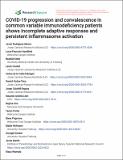Por favor, use este identificador para citar o enlazar a este item:
http://hdl.handle.net/10261/307726COMPARTIR / EXPORTAR:
 SHARE
BASE SHARE
BASE
|
|
| Visualizar otros formatos: MARC | Dublin Core | RDF | ORE | MODS | METS | DIDL | DATACITE | |

| Título: | COVID-19 progression and convalescence in common variable immunodeficiency patients shows incomplete adaptive responses and persistent inflammasome activation |
Autor: | Rodríguez-Ubreva, Javier; Handfield, Louis-Francois; Keller, Baerbel; Ciudad, Laura CSIC ORCID; Calle-Fabregat, Carlos de la; Godoy-Tena, Gerard; Calafell-Segura, Josep; Andrés-León, Eduardo CSIC ORCID CVN ; Hoo, Regina; Porter, Tarryn; Prigmore, Elena; Hofmann, Maike; Decker, Annegrit; Martín, Javier; Klaus Warnatz; Vento-Tormo, Roser; Ballestar, Estéban | Fecha de publicación: | 14-nov-2022 | Editor: | Research Square | Citación: | Research Square: 10.21203/rs.3.rs-2246352/v1 (2022) | Resumen: | Patients with common variable immunodeficiency (CVID), the most prevalent symptomatic primary immunodeficiency, are characterized by hypogammaglobulinemia, poorly protective vaccine titers and increased susceptibility to infections. New pathogens such as the severe acute respiratory syndrome coronavirus 2 (SARS-CoV-2), the causative agent of coronavirus disease 2019 (COVID-19), might constitute a particular threat to these immunocompromised patients since many of them experience a slower recovery and do not achieve full response to SARS-CoV-2 vaccines. To define the molecular basis of the altered immune responses caused by SARS-CoV-2 infection in CVID patients, we generated longitudinal single-cell datasets of peripheral blood immune cells along viral infection and recovery. We sampled the same individuals before, during and after SARS-CoV-2 infection to model their specific immune response dynamics while removing donor variability. We observed that COVID-19 CVID patients show defective canonical NF-κB pathway activation and dysregulated expression of BCR-related genes in naïve B cells, as well as enhanced cytotoxic activity but incomplete cytokine response in NK and T cells. Moreover, monocytes from COVID-19 CVID patients show persistent activation of several inflammasome-related genes, including the pyrin and NLRC4 inflammasomes. Our results shed light on the molecular basis of the prolonged clinical manifestations observed in these immunodeficient patients upon SARS-CoV-2 infection, which might illuminate the development of tailored treatments for COVID-19 CVID patients. | Versión del editor: | https://doi.org/10.21203/rs.3.rs-2246352/v1 | URI: | http://hdl.handle.net/10261/307726 | DOI: | 10.21203/rs.3.rs-2246352/v1 |
| Aparece en las colecciones: | (PTI Salud Global) Colección Especial COVID-19 (IPBLN) Artículos |
Ficheros en este ítem:
| Fichero | Descripción | Tamaño | Formato | |
|---|---|---|---|---|
| COVID-19 progression.pdf | 2,65 MB | Adobe PDF |  Visualizar/Abrir |
CORE Recommender
Page view(s)
35
checked on 15-may-2024
Download(s)
21
checked on 15-may-2024
Google ScholarTM
Check
Altmetric
Altmetric
Este item está licenciado bajo una Licencia Creative Commons

